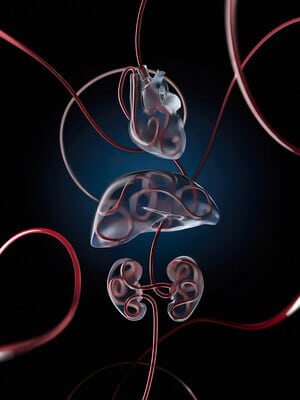Technology developed at Yale University restores the function of cells and organs in pigs after death, a potential breakthrough in organ transplantation.

Within minutes of the last heartbeat, a chain of biochemical events caused by the lack of blood flow, nutrients and oxygen begin to destroy the body's cells and organs. But, a team of researchers at Yale University found that massive and permanent cell failure doesn't have to happen so quickly.
Using a new technology the scientists developed that delivers a specially developed cell-protecting fluid to organs and tissues, researchers restored blood flow and other cell functions in pigs a full hour after they died. They report their findings in the August 3 edition of the journal Nature.
Their results may prolong the healthy state of human organs during surgeries and increase the availability of donor organs, the authors said.
"All cells don't die immediately, there's an ongoing series of events," said David Andreevich, a neuroscience researcher at Yale School of Medicine and co-lead author of the study. "It's a process in which you can intervene, stop and restore some of the cell functions."
The research builds on a previous Yale-led project that restored blood flow and certain cell functions in the brain of a dead pig using a technology known as BrainEx. The previous study published in 2019 and the new study were led by the Yale laboratory of Ninad Sastan, professor of neuroscience and comparative medicine, genetics and psychiatry.
"Since we were able to restore certain cell functions in the dead brain, an organ that is known to be very sensitive to ischemia (insufficient blood supply), we hypothesized that it is possible to achieve something similar in other vital organs, including those that can be transplanted," Sastan said.
In the new study, the researchers used a modified version of BrainEx, named OrganEx, in the whole pig. The technology includes a perfusion device similar to cardiopulmonary machines—which perform the operation of the heart and lungs during surgery—and an experimental fluid that contains compounds that can aid cell health and suppress inflammation throughout the pig's body. Cardiac arrest was induced in anesthetized pigs treated with OrganEx XNUMX hour after death.
Six hours after the OrganEx treatment, the researchers found that certain important cell functions were active in many areas of the pig's body—including the heart, liver, and kidneys. In addition, some organ functions were restored. For example, they found evidence of electrical activity in the heart, which maintained the ability to contract.
"We were also able to restore blood flow throughout the body, which amazed us," Sastan said.
"Normally when the heart stops beating, organs begin to swell, collapse blood vessels and block blood flow," he said, "but blood flow was restored and organs in the dead pigs treated with OrganEx appeared to be functioning at the cellular and tissue level."
"Under the microscope, it was difficult to differentiate between a healthy organ and an organ treated with OrganEx technology after death," said researcher Zvonimir Varslia.
As in the 2019 experiment, the scientists also found that cell activity in certain areas of the brain was restored. But no organized electrical activity indicating recognition was detected in any part of the experiment.

One response
Step back to the pig, step forward to the researcher.